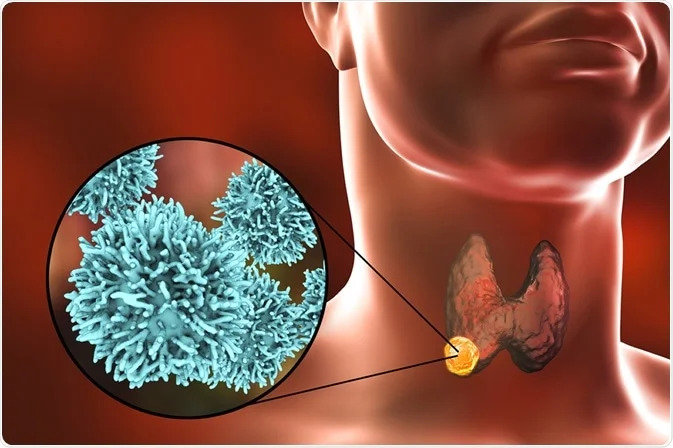Preventive Healthcare
Thyroid Cancer: All You Need to Know

Table of Contents
The thyroid is a gland located in the front of the neck and is responsible for producing hormones that control metabolism, heart rate, blood pressure, and body temperature. Thyroid cancer occurs when the cells in the gland start to grow and multiply uncontrollably. This cancer is rare and more common in women than in men.
What Are the Types and Causes of Thyroid Cancer?
Depending upon the cell where cancer begins, there are different types of thyroid cancer, namely:
- Papillary thyroid cancer: This is the most common thyroid cancer, affecting nearly 80% of people.
- Follicular thyroid cancer: This is the second most common type of thyroid cancer that occurs in the older age group.
- Hurthle cell cancer: Classified as a type of follicular thyroid cancer, Hurthle cell cancer is more likely to spread to lymph nodes.
- Medullary thyroid cancer: It is a rare form of thyroid cancer that is tender and painful to touch.
- Anaplastic thyroid cancer: It is the least common yet the most dreadful of all thyroid cancers. This cancer has a very low cure rate.
The exact cause of thyroid cancer is unknown, but a few factors may increase the risk of developing this condition. These include:
- Gender: Women have a greater risk for this cancer.
- Age: Though thyroid cancer can occur at any age, two-thirds occur among people between 20 and 55 years old.
- Genetics: Heredity and mutations in some genes may increase an individual’s risk of developing this cancer.
- Race: White and Asian people are at an increased risk of this cancer.
- History of breast cancer: Breast cancer survivors may be at a higher risk for thyroid cancer, as per a recent study.
- Obesity: The risk for thyroid cancer is higher among people who are overweight or obese.
- Non-cancerous thyroid conditions: People with some non-cancerous thyroid conditions such as goitre, Hashimoto’s disease, or adenomas are at a higher risk of developing thyroid cancer.
- Radiation therapy: The thyroid gland is sensitive to radiation. So, people who have undergone radiation therapy in childhood are at a greater risk of developing thyroid cancer.
Signs and Symptoms of Thyroid Cancer
Most people with thyroid cancer do not show any signs and symptoms, especially in the early stages. Thyroid cancers are often diagnosed during routine neck examinations.
Common thyroid cancer symptoms include:
- A lump in the neck
- Hoarseness of voice
- Swollen glands in the neck
- Difficulty in swallowing
- Difficulty in breathing
- Pain in the neck or throat
- A persistent cough that is not caused by cold
How is Thyroid Cancer Diagnosed?
If your doctor suspects you have thyroid cancer, they will recommend a series of tests to confirm their diagnosis. Not everyone requires the same diagnostic tests, and a few factors considered before recommending them are:
- Type of cancer suspected
- Signs and symptoms experienced
- Age, general health, and fitness of the individual
- Results of medical tests performed to date
How is Thyroid Cancer Treated?
Thyroid cancer is treated by a multidisciplinary team of doctors. Thyroid cancer treatment depends upon the following factors:
- Where the cancer is
- Stage and grade of the cancer
- Type of thyroid cancer
- The extent of the spread of thyroid cancer
- Your overall health and fitness
A few tests that are recommended for thyroid cancer diagnosis are:
- Blood tests
Blood tests measure different parameters during the diagnosis and treatment of thyroid cancer. A few of these include:
-Thyroid hormones levels
-Thyroid-stimulating hormone
-Thyroglobulin (a protein made by the thyroid gland and the thyroid cancer cells)
- Ultrasound
This imaging test gives your doctor a complete picture of the thyroid gland.
- Biopsy
If your doctor suspects thyroid cancer from the diagnostic tests, they may perform a biopsy during which a small tissue from the suspected lesion is collected and sent to the lab for analysis. A biopsy may be done in one of the two following ways:
-Fine needle aspiration
-Surgical biopsy
Other tests that may be routinely performed include:
- CT scan
- Radionuclide scanning
- PET Scan
Standard treatment options for thyroid cancer include:
- Surgery
This is the standard first-line treatment for thyroid cancer. Depending upon the size and location of the tumour, thyroid cancer surgery may remove it along with some surrounding healthy tissue. In some cases, the entire gland may be removed to limit the spread of cancer.
- Radioactive iodine treatment
A pill or liquid containing a high dose of radioactive iodine is given to the patient. The radioactive iodine shrinks the tumour in the thyroid and kills cancer cells.
- Thyroid hormone therapy
Thyroid cancers that grow in response to hormone exposure can be treated with hormone therapy. Drugs that block hormone receptors are given to stop the growth and spread of cancer.
- Targeted cancer drugs
Targeted cancer therapy uses drugs that specifically target the thyroid cancer cells and prevent them from growing and multiplying. This treatment causes lower side effects than traditional chemotherapy.
- Chemotherapy
Though not routinely used in treating thyroid cancer, chemotherapy is preferred when the cancer is advanced and has spread to other parts of the body.
Key Takeaway
Though thyroid cancers are less common, they may occur in any age group. If you experience any signs or symptoms of thyroid cancer, seek immediate consultation with your doctor.




























